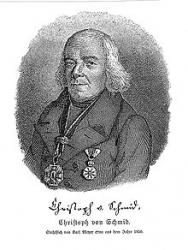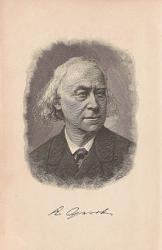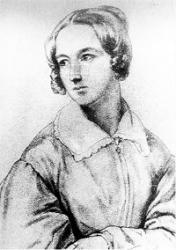Planning worship?
Check out our sister site, ZeteoSearch.org,
for 20+ additional resources related to your search.
- |
User Links
Person Results
‹ Return to hymnal



Export as CSV
Christian Gottlob Barth
1799 - 1862 Person Name: Chr. G. Barth Hymnal Number: 252 Author of "Auf einem Berg ein Bäumlein" in Glockenklänge Barth, Christian Gottlob, son of C. F. Barth, house painter in Stuttgart, was born at Stuttgart, July 31,1799. He studied at Tubingen, where he was the principal founder of the Missionary Society, and was only restrained by his mother's entreaties from offering himself as a missionary. He became, in 1821, assistant at Neckarweihingen and Dornham, and, in 1822, curate in charge of Effringen and Schönbrunn, near Nagold. In 1824 he was appointed pastor of Möttlingen, near Calw, but resigned his charge in 1838, and settled in Calw, receiving in the same year the degree of D.D. from the University.of Greifswald. He died at Calw of apoplexy, Nov. 12, 1862. At Calw he devoted himself as a writer and preacher to children, as a preacher and writer in the cause of missions to the heathen and to the Jews, and as the founder and director of the Tract Society of Calw. One of his books, the Bible History, reached its 160th edition in 1872, and had then been translated into 24 European, 18 Asiatic, 7 African, and 3 South Sea languages. He frequently attended the meetings of the Religious Tract Society of London, and was a member of the Evangelical Alliance (Koch, vii. 199-210; Allgemeine Deutsche Biographie, ii. 94-95). Of his hymns there have been translated into English:—
i. Auf einem Berg ein Baumlein stand. [Holy Scripture]. Included in his Lieder und Gedichte fur Christenkinder, Calw, 1842, p. 83, in 4 stanzas. Previously in J. Köbner's Christl. Harfentöne, Hamburg, 1840, p. 115. The translations are:—
(1) "Upon a hill there stands a tree," by Dr. H. Mills, 1845 (1856, p. 25), and thence in P. Stow's Ocean Melodies, Boston, U.S., 1849. (2) "A tree grows on a mountain," by Mrs. Bevan, 1859, p. 138. (3) "A tree stood on a mountain," in Dr. H. W. Dulcken's Golden Harp, 1864, p. 22. (4) " On a hill stands a beautiful tree," in W. B. Bradbury's Fresh Laurels, N. Y., 1867, p. 15, signed "L. W." (5) " Lo, on a mount a tree doth stand," by Mrs. H. K. Spaeth, as No. 60 in the Pennsylvania Lutheran Little Children's Book, Philadelphia, 1885.
ii. Erhebe dich, du Volk des Herrn. [Missions.] Written for the Basel Mission Festival, June 12, 1833, In his Christliche Gedichte, Stuttgart, 1836, p. 18, in 8 stanzas. Translated as “Ye people of the Lord, arise!" by Dr. H. Mills, 1856, p. 202.
iii. Hütter, ist die Nacht verschwtinden. [Missions.] Written for the 20th anniversary, June 27,1835, of the Basel Missionary Society, and first published in the Mission Magazine for that year. In his Christliche Gedichte, Stuttgart, 1836, p. 54, in 8 stanzas. The translations are:—
(1) "Ho! watchman, is the night away," by Dr. G. Walker, 1860, p. 84. (2) "Watchman! Hath the night departed," in L. Rehfuess's Church at Sea, 1868, p. 107. [Rev. James Mearns, M.A.]
-- John Julian, Dictionary of Hymnology (1907)
Christian Gottlob Barth
F. Grether
Hymnal Number: 144 Translator (vs. 2 and 3) of "Heilig, heilig, heilig" in Glockenklänge
F. Grether
C. A. G. Eberhardt
Hymnal Number: 273 Author (v. 1) of "Die Sterne!" in Glockenklänge
C. A. G. Eberhardt
F. W. Berlemann
Hymnal Number: 120 Translator of "Dein Wille, Herr, gescheh'!" in Glockenklänge Rev. F. W. Berlemann was a pastor of the German Reformed Church of St. Lucas in 1899.
NN, Hymnary. From the October 15, 1899 issue of The Times from Philadelphia, Pennsylvania
F. W. Berlemann
Carl Abela
1803 - 1841 Person Name: C. Abela Hymnal Number: 164 Composer of "[Frühling, der die Welt verklärt]" in Glockenklänge Carl Gottlob Abela (Karl), born at Borna, Saxony, April 29, 1803, died at Halle, April 22, 1841. Vocal composer, pupil in Dresden of A. G. Fischer; went to Halle in 1825, and shortly after was made cantor at St. Mary's Church, He did much toward the promotion of vocal music in the public schools. Works: Collection of songs for two, three and four voices (Sammlung zwei,=drei und vierstimmiger lieder zum gebrauche beim gesangangterrichte in schulenLeipzig: Hartknoch, 4th ed. 1841) 160 songs, followed by canons for several voices (Breitkopf & Härtel); 120 quartets for male voices; Der Sängerbad, quartest for do (Halle, Knapp)
Cyclopedia of Music and Musicians by John Denison Camplin, Jr. and William Foster Apthorp (Charles Scribner’s Sons, 1888)
Carl Abela
Joseph Gersbach
1787 - 1830 Person Name: Gersbach Hymnal Number: 256 Composer of "[Was ist schöner, als Gott dienen]" in Glockenklänge
Joseph Gersbach
Christoph von Schmid

1768 - 1854 Person Name: Chr. v Schmid Hymnal Number: 9 Author of "Ihr Kinderlein Kommet" in Glockenklänge Johann Christoph von Schmidt DT Germany 1768-1854. Born at Dinkelsbuhl, Bavaria, Germany, the oldest of nine children and son of a civil servant who worked for the Teutonic Order, he received private lessons in the monastery and attended Catholic Latin school for two years, then attended the Dillingen high school, afterward tutoring for a wealthy family. He enrolled in the Episcopal University in Dillingen and studied philosphy for two years, then theology for four years. He was ordained a Roman Catholic priest in 1791. He served as parish vicar in Nassenbeuren, then chaplain at Seeg. In 1796, when he was placed as the head of a large school in Thannhausen, where he taught for many years. From 1816-1826 he was parish priest at Oberstadion in Wurttemberg. In 1826 he was appointed Canon of the Augsburg Cathedral. In 1832 he was administrator for the school system for Swabia and Neuburg. In 1837 he was raised by Bavarian King Ludwig I to personal nobility, a knight of the Order of Merit of the Bavarian Crown. In old age he received numerous honors, and his 80th birthday was a public holiday in Augsburg. The University of Prague awarded him the title of Doctor of Theology. In addition to being an educator, he was also a prolific author and writer of children’s stories. He would often read his stories to the school children after classes. His stories became very popular and were translated into 24 languages. His general theme in story writing was to awaken a practical piety in children. Wrote 40 story books for children. He also wrote poetry. His most famous work: “A basket of flowers”. He died of cholera at Augsburg, Germany. In 1857 his autobiography was published.
John Perry
Christoph von Schmid
Karl W. Grimm
Hymnal Number: 141 Composer of "[Es strahlt durchs Erdendunkel]" in Glockenklänge
Karl W. Grimm
Karl Gerok

1815 - 1890 Person Name: Gerok Hymnal Number: 2 Author of "O heiliger Abend" in Glockenklänge Gerok, Karl von, D.D , was born January 30, 1815, at Stuttgart, and studied theology at the University of Tubingen. He was, from 1836 to 1840, assistant at his father's church in Stuttgart; 1840-43, lecturer (repetent) at Tübingen, and after 1844 diaconus at Böblingen, near Stuttgart. In 1849 he returned to preach at Stuttgart, where he now resides (1886), as chief court preacher and oberconsistorialrath (0. Kraus, 1879, p. 165: manuscript from Dr. von Gerok, &c).
Gerok is well known as an eloquent preacher, and has published various volumes of sermons. His fame principally rests on his sacred poetry. The best known of his poetical works is his Palmblätter, 1857, which has attained a wonderful circulation, and reached a 56th edition in 1886. A new series appeared in 1878 as Palmblätter Neue Folge (9th ed., 1885, under the title Auf einsamen Gängen). A series of poems on the Book of the Acts of the Apostles appeared as Pfingstrosen, 1864, (8th ed. 1886). His other poetical works are, Die letzte Strauss, 1885 (5th ed., 1886), Blumen und Sterne, 1867 (11th ed., 1886), and Deutsche Ostern, 1872(6th ed., 1883). The Palmblätter is in four parts: pt. 1 consisting of poems on Holy Words, i.e. mostly founded on sayings of Holy Scripture; pt. ii. on "Holy Times" (Advent, &c); pt. iii. on "Holy Mountains," and pt. iv. on "Holy Waters," i.e. on Mountains and Waters mentioned in Holy Scripture. From it a few centos have passed into some of the recent German hymn-books; and a version apparently including translations of all the poems in the ed. of the German used appeared in English as Palm leaves by Karl Gerok. Translated from the German by J. E. A. Brown. London: Strahan & Co., 1869. A large number of the individual poems have also been tr, by Miss Borthwick (who has also translated a few from the Pfingstrosen), Miss Burlingham, the Revs. Dr. R. Maguire, E, Massie, J. Kelly, and various others. But as none of these versions have passed into English common use, and as the originals are poems and not hymns, we must refer the reader to the works of these translators.
[Rev. James Mearns, M.A.]
-- John Julian, Dictionary of Hymnology
Karl Gerok
Luise Hensel

1798 - 1876 Hymnal Number: 44 Author of "Was verlangst du, warum bangst du?" in Glockenklänge Text of "Müde bin ich geh zur Ruh" is printed in Lutheran Service Book, 2006 #887
=============
Hensel, Luise, daughter of J. J. L. Hensel, Lutheran pastor at Linum, near Fehrbellin, Brandenburg, was born at Linum, March 30, 1798, Though confirmed as a Lutheran in her fifteenth year, she gradually approximated to Roman Catholicism, and was formally received into that Communion, Dec. 7, 1818. During the remaining years of her life, she devoted herself mainly to the education of the young and the care of the sick. In 1874 she entered the Union of Daughters of Christian Love at Paderborn, and died at Paderborn, Dec. 18, 1876. (O. Kraus, 1879, pp. 204-211; Allgemeine Deutsche Biographie, xii. 1-3, &c.) Her best hymns were written before she was 23, and in proportion as she became an Ultramontane the poetical value of her productions declined. Her finest productions are distinguished by childlike simplicity, humility, resignation, and deep Christian love. They have won wide acceptance in Germany. The first two of those noted may be regarded as nursery classics.
A number of her hymns came into Clemens Brentano's hands as early as 1819, and were by mistake included as his in his posthumous works. A few were printed in F. Förster's Sängerfahrt, 1818, and a good many more in M. Diepenbrock's Geistlicher Blumenstrauss, Sulzbach, 1829. A complete edition of her hymns was published by Professor C. Schlüter of Münster as her Lieder at Paderborn, 1870 (4th ed., 1879).
i. Hymns in English common use:
i. Immer muss ich wieder lesen. [Holy Scripture.] This beautiful children's hymn on the Life of Christ as narrated in the Gospels, appeared in Diepenbrock, 1829, p. 265, in 7 stanzas of 4 lines (entitled "On the reading of Holy Scripture "); and in her Lieder, 1870, is dated Berlin,
1815. It is repeated in Knapp's Evangelischer Lieder-Schlatz, &, 1837, the Württemberg Gesang-Buch, 1842, &c. Translated as:—
Ever would I fain be reading. A good and full translation by Miss Winkworth in her Lyra Germanica, 2nd Ser., 1858, p. 24. It has been included in full in Psalms & Hymns, Bedford, 1859; Kennedy, 1863; Book of Praise for Children, 1881; and in America in Hatfield's Church Hymn Book, 1872, and others. In some collections it is abridged; and in the Unitarian South Place Collection, 1873, it begins, "Ever find I joy in reading."
Other translations are:—
(1) “O how sweet the wondrous story," by Mrs. Bevan, 1859, p. 142. (2) "In that book so old and holy," in Dr. H. W. Dulcken's Golden Harp, 1864, p. 25. (3) "Still I read, and weary never," by “A. M. A," in the British Herald, Feb. 1868, p. 211.
ii. Müde bin ich, geh' zur Ruh. [Evening.] This beautiful child's evening prayer, the most popular of all her hymns, appeared in Diepenbrock, 1829, p. 270, in 4 stanzas of 4 lines. In her Lieder, 1870, p. 54, dated Berlin, Autumn, 1816. Included in the Unverfälscher Liedersegen, 1851, No. 528. Translated as:—
1. Now that o'er each weary head. A free translation of stanzas i.-iii. as No. 22 in C. H. Bateman's Children's Hymns, 1872.
2. Weary now I go to rest. A good translation of stanzas i.-iii. by E. Cronenwett as No. 324 in the Ohio Lutheran Hymnal 1880.
Other translations are:—
(1) "Now I close my tired eyes," by Mrs. Bevan, 1859, p. 147. (2) "I am tir'd, and so I seek," by Miss Manington, 1863, p. 126. (3) "Weary now I go to bed," in Dr. H. W. Dulcken's Golden Harp, 1864, p. 40. (4) “Now with weariness opprest," a second translation by Dr. Dulcken, p. 72. (5) “Wearied now I seek repose," by J. Kelly, 1885, p. 111.
ii. Hymns not in English common use:
iii. Ich liebe einen Königs Sohn. [Love to Christ.] In Diepenbrock, 1829, p. 304, in 9 stanzas, and in her Lieder, 1870, p. 67, dated Berlin, 1817. Translated as "I love a royal only Son," by E. Massie, 1867, p. 174.
jv. 0 Sonne, wenn von deinem Licht. [Love to Christ.] In Diepenbrock, 1829, p. 257, in 6 stanzas, and in her Lieder, 1870, p. 128, dated Söndermühlen, 1823. Translated as "O Sun, if from thy light a ray," in J. D. Burns's Memoir and Remains, 1869, p. 270.
v. 0 Sorge, die mien niederdrückt. [Encouragement.] In Diepenbrock, 1829, p. 271, in 6 stanzas, and in her Lieder, 1870, p. 13, dated Berlin, 1815. The translations are:—(1l) "O anxious care that weighs me down," by Miss Burlingham, in the British Herald, Sept. 1865, p. 144. (2) "Begone, O load of care, begone," by J. Kelly, 1885, p. 80.
vi. Was verlangst du, warumbangst du. [Cross and Consolation.] In Diepenbrock, 1829, p. 261, in 6 stanzas entitled "Suraum corda." In her Lieder, 1870, p. 43, it is dated Berlin, 1816. Translated as "What seekest thou! Why fearest thou," by C. T. Astley, 1860, p. 28.
vii. Zu dir, zu dir, hinweg von mir. [Consecration to Christ.] In Diepenbrock, 1829, p. 267, in 5 stanzas In her Lieder, 1870, p. 31, dated Berlin, 1816. Translated as "To Thee, to Thee, away from self," by J. Kelly, 1885, p. 72. [Rev. James Mearns, M.A.]
-- John Julian, Dictionary of Hymnology
=====================
Hensel, Luise, p. 510, ii., No. v. "O Sorge," &c, appeared in Förster's Sängerfahrt, 1818, p. 266.
--John Julian, Dictionary of Hymnology, Appendix, Part II (1907)
Luise Hensel


 My Starred Hymns
My Starred Hymns


